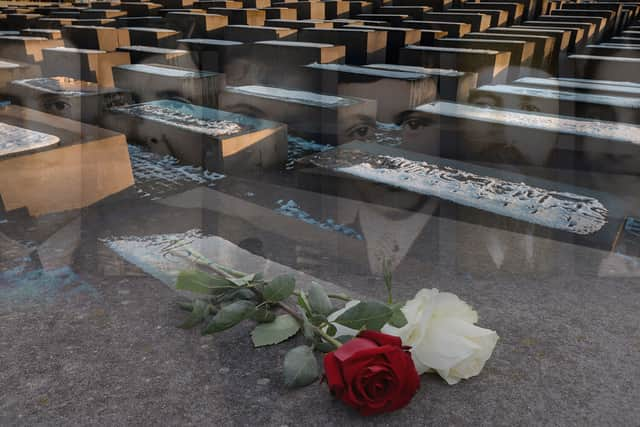Holocaust Memorial Day 2023: what is the meaning of the word Holocaust and what does Shoah mean in Hebrew?
This article contains affiliate links. We may earn a small commission on items purchased through this article, but that does not affect our editorial judgement.
and live on Freeview channel 276
Every year, people are asked to remember the millions of Jewish people who lost their lives and were persecuted for their religion because of Adolf Hitler’s Nazi regime in Germany during the Second World War.
This day is called Holocaust Memorial Day. The Holocaust is primarily associated with the murder of Jewish people, although victims from several groups were killed. Nazis viewed other groups of people as inferior also, such as Slavic people, particularly the Polish, the Russians and the Romanians, the disabled, Jehovah’s Witnesses, communists, and homosexuals.
Advertisement
Hide AdAdvertisement
Hide AdOnly the Jews were targeted for complete elimination, however, and their death was imperative to Hitler’s vision of the “New Germany”. The Nazi campaign against the Jews lasted until the end of the Second World War in 1945. In total, more than 11 million people were killed during the Nazi regime, and around six million of these were thought to be Jewish.
We have all come to associate the word Holocaust with this atrocity, and another word we may have heard alongside it is Shoah, but what exactly do these words mean and what are their origins? Here’s what you need to know.
What is the meaning of the word Holocaust?
Historians commonly define the Holocaust as the genocide of the European Jews by Nazi Germany and its collaborators between 1941 and 1945, and this is also what children are taught in their education.
The word Holocaust is derived from the Greek word “holokauston” which is a translation of the Hebrew word olah’, meaning a burnt sacrifice offered whole to God. This word was chosen because during the genocide Jewish people were sent to extermination camps where they were killed, and the the bodies of the victims were put on open fires, according to Britannica, the world’s oldest continuously published encyclopaedia.
Advertisement
Hide AdAdvertisement
Hide AdHolocaust is also defined in three different ways by the Merriam Webster dictionary:
- A sacrifice consumed by fire
- A thorough destruction involving extensive loss of life especially through fire
- The mass slaughter of European civilians and especially Jews by the Nazis during World War II, specifically genocide
This use of the word Holocaust can be found as early as May 23 1943 in The New York Times in an article by Julian Meltzer, referring to feelings in Palestine about Jewish immigration of refugees from "the Nazi holocaust."


One significant use of the term came in a 1958 memoir ‘The Survivors: the Story of the Belsen Remnant’ by Leslie Hardman, the first Jewish British Army Chaplain to enter Bergen-Belsen concentration camp in April 1945. He ministered to survivors and supervised the burial of about 20,000 victims. He wrote: “Towards me came what seemed to be the remnants of a holocaust – a staggering mass of blackened skin and bones, held together somehow with filthy rags.”
The term holocaust has also became used as synonym for the word "genocide" to refer to mass murders of specific groups of people, for example the Rwandan holocaust of 1994. The word is therefore used to suggest comparison with the horrific scale of the Nazi murders of Jewish people in other events.
What does Shoah mean in Hebrew?
Advertisement
Hide AdAdvertisement
Hide AdShoah is the Hebrew word for “catastrophe”, and the Holocaust is sometimes referred to as “the Shoah”, according to the Merriam Webster dictionary. It refers specifically to the six million Jews who were killed during the genocide of Jews at the hands of Nazis during WW2. It is thought that word has also been used since the 1940s.
What is Holocaust Memorial Day?
Holocaust Memorial Day is a day which asks people to remember those who lost their lives due to genocide. It is also a day when survivors share their stories. The Holocaust Memorial Day Trust (HMDT), a charity established and funded by the UK Government to promote and support Holocaust Memorial Day, said that the day commemorates those who lost their lives during the Nazi rule and also other genocides which have happened in the world.
They state the day is to “remember the six million Jews murdered during the Holocaust, alongside the millions of other people killed under Nazi persecution of other groups and in genocides that followed in Cambodia, Rwanda, Bosnia and Darfur”.
During this day, people are asked to come together to learn more about those who have endured genocide, and also honour the survivors, those who lost their lives and those whose lives were changed forever because of what happened to them or their family and friends.
Advertisement
Hide AdAdvertisement
Hide AdThe HMDT said: “Holocaust Memorial Day is a day for everyone. The Holocaust was a tragically defining episode of the 20th Century and its unprecedented character will always hold universal meaning. People from all parts of the UK and of all ethnicities, religions and interests come together to mark Holocaust Memorial Day.”
When is it - and what’s the significance of the date?
Holocaust Memorial Day takes place every year on 27 January, which means that in 2023 it falls on Friday 27 January. This date was chosen specifically because it marks the anniversary of the liberation of the largest Nazi death camp, Auschwitz-Birkenau.
Comment Guidelines
National World encourages reader discussion on our stories. User feedback, insights and back-and-forth exchanges add a rich layer of context to reporting. Please review our Community Guidelines before commenting.
